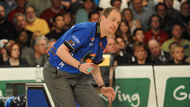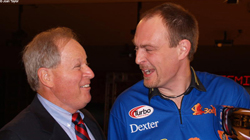Mika Koivuniemi's long, hard road to history

 Sometimes money does strange things to people. In Mika Koivuniemi’s case, money did the strangest thing of all: It almost made him seem vulnerable.
Sometimes money does strange things to people. In Mika Koivuniemi’s case, money did the strangest thing of all: It almost made him seem vulnerable.
In a news conference after winning $250,000 in the 2011 Tournament of Champions at Red Rock Lanes in Las Vegas, the 6-foot-4 Finn once described as a guy who “zeroes in on his prey like a leopard on one of those old Wild Kingdom television shows” allowed a rare glimpse of the man behind the leopard’s eyes.
“It’s a lot of money and it’s going to help with the tough times I’ve been through lately,” Koivuniemi said. “Hopefully I invest it right. That’s my goal.”
And just as quickly the leopard returned, the one who seems as averse to vulnerability off the lanes as he is on them. Asked if he could speak more about those hard times, “Major Mika” answered in a way so characteristic of the man the bowling world has come to know that the room ignited with laughter.
“No,” he said.
And that was that. After all, this is Mika Koivuniemi, who couldn’t help but chuckle the night before at suggestions that bowling for $250,000 would afflict him with even the slightest case of nerves.
“I’m used to six-figure paydays,” he remarked with a wry smile as if to say “Guys, I am Mika Koivuniemi. Remember?”
Those who have been paying attention will remember well the $100,000 top prize he claimed at the 2001 U.S. Open, just months removed from becoming the first international player ever to win the USBC Masters. They will remember the $100,000 he won at the 1997 Super Hoinke Bowling Classic in Cincinnati. They will remember the 300 game worth just as much that he bowled at a tournament called, of all things, the Santa Claus Open in Singapore in 1994.
Santa must have been working overtime on Saturday afternoon, furnishing Koivuniemi with a gift that couldn’t have come at a better time for the man whose vow to “invest it right” offers a clue to those hard times he’s had. Even PBA Commissioner and CEO Fred Schreyer implored him to do the same as he presented Koivuniemi with an oversized check and smiled with him for photos, expressing a hope that he would “invest it wisely.”
“Koivuniemi does not like to talk about the money he lost, but it was substantial,” reports one newspaper in his native Finland, Helsingin Sanomat.
But whether you’re recovering from investments gone bad or just fattening your coffers, who doesn’t need a quarter-of-a-million dollars? And anyway, Koivuniemi is hardly a stranger to the risks that come with great rewards. Maybe some of them haven’t panned out as well as others, but you don’t harbor dreams of becoming “the best bowler in the world” without taking some chances along the way.
When Koivuniemi showed up at friend Patrick Healey’s house in Niagara Falls years ago with nothing more than six suitcases and a dream, he did not do it because he likes to play it safe. He did it because he likes to win.
“We sold everything we could to move to the U.S.,” he said in 1998. “Everything but the six suitcases.”
He came for the money, a fact he conceded so casually that it seemed like the possibility of failure never occurred to the leopard inside the man. It rarely does to those who follow their dreams wherever they lead.
“If I wanted to make more money, I’d have to come over here to make it,” Koivuniemi said of the move. “I never really made money bowling in Finland.”
The first time Koivuniemi bowled one of the megabucks events in Vegas that Healey told him to take a crack at, he ended up with little more than a $200 dent in his bank account to show for it. That move to the U.S. culminated in an exhausting struggle for American citizenship which, as Dave McMahon put it in one Bowlers Journal story, “felt like he was carrying a piano on his back up a staircase.”
And his first foray on tour “was discouraging enough to send him and wife Leena back to Finland to regroup,” wrote BJI’s Dennis Bergendorf, who characterized his subsequent 2002-03 season as “a disaster.”
Those are the chances you take when you want to be great. Koivuniemi took them because he already knew he was great, because he never doubted that it was only a matter of time before everyone in America knew that as well as they did back home. And when the smoke of endless paperwork and poor debuts finally cleared, the man had a lot more than a lighter wallet to show for it.
He banked $10,000 at the same event that previously relieved him of that $200. He racked up those consecutive majors at the Masters and U.S. Open in 2000 and 2001, defeating a childhood idol in Pete Weber at the Masters and another familiar face in Patrick Healey for the latter title.
And he shot a televised 300 game at the 2003 Cambridge Credit Classic which, with bonuses from the sponsor and the PBA on top of his first-place check, netted him a total of $70,000.
Yes, anyone who has been paying attention remembered well the Mika Koivuniemi who smiled over the $250,000 check Fred Schreyer presented him on Saturday. That “Big Finn” who zeroes in on his target the way a leopard stares down a deer may be “used to six-figure paydays,” but even he had to know this wasn’t just any other big-money win.
This was a quarter-of-a-million dollars, enough to put his oldest child through college next fall. And, who knows, maybe a check like that is enough even to soften the blow of those bad financial turns in his past.
“It means a great deal for his confidence, and he’s had some hard times here in the last couple years financially so I think this is going to help him out a great deal,” says Dave Bernhardt of Turbo 2-N-1 Grips, one of Koivuniemi’s earliest sponsors and a man he refers to as a father figure. “You know, it doesn’t look like it when you see him on TV, but I see things in his demeanor that others don’t see because I know him, and I can tell you that he was jumping for joy.”
However he puts that $250,000 to use, the globe-trotting dreamer with the steel exterior knew what his first priority needed to be on Saturday night.
“I’m gonna party tonight for sure,” he said after the win.





